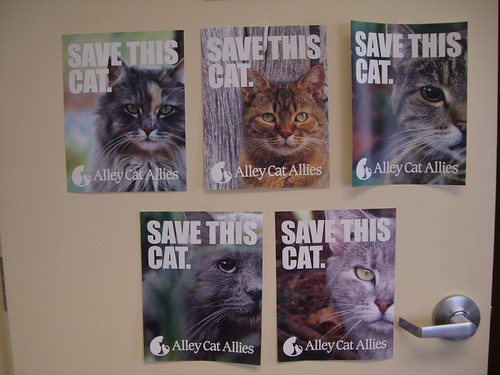Friday, May 30, 2008
More suspected abuse cases
Thursday, May 29, 2008
Cat Basket at ACA
Here's a basket for the office cats to sleep in. You have to love an office that is so animal friendly - though of course they would be!
Save this Cat
I went by to see the lovely people at Alley Cat Allies today and saw these gorgeous posters!
I also got to play with the office cats and a new office dog - a huge, friendly black dog.
Wednesday, May 28, 2008
The Press
I'm posting this after reading some letters and thinking about some comments that people have made to the press. I am sure that most people when speaking to the press mean well - they want to share information/get the message out and the press can be an incredibly powerful ally. After all, they have the reach that none of us have and is a great way to get your message out there.
On the other hand, remember the power of the press can work both ways. It's a double edged sword and has brought even Presidents down. It can also be very harmful if the wrong message gets out.
So here are a few basic pointers I think are worth bearing in mind when dealing with the press.
Firstly, what is your message? I have spoken to caregivers who were thinking of writing in or going on television who did not have know what message they wanted to impart. If you don't know what you're trying to say, you can't convey it. You are also far more likely to say something that can be harmful to your cause.
Secondly, keep it concise. You need your message to be short. If it's in a letter, then check what the word limit is - most forums will have one. The less you put in there, the less the editors will have to cut out.
On television it's even more important to be concise. When you see someone on television in advertisements, you rarely hear them give long, rambling discussions. They speak in soundbites - short, pithy, easily remembered sentences. These should be as short as possible - around 30 seconds at most.
Thirdly, focus on one issue at a time. There are often many reasons for why something happens. For example, why are cats killed? Is it because of complaints? Abandonment? People who aren't sterilising? Irresponsible feeders? The list goes on. Too many issues cloud the whole discussion. Focus on one or two of these issues - you can also mention the rest at a later time. What are the most important issues right now in response to what you want to get across?
Fourth, weigh the pros and cons. If you're going to the press, what do you hope to achieve exactly? There must be an end goal. If the end goal is just 'press attention' I suggest you re-think it. That attention has to serve some purpose. Also weigh the bad press and backlash you are going to get in response - and there will always be backlash. For example, in this case of the Jurong dogs, the backlash is obviously one, that ALL animals could get complained about because there will be complainants who like neither cats nor dogs. Two, it can be blown up into what becomes a schism in the animal welfare groups - ie dog versus cat.
Fifth, remember you set the agenda. You don't have to talk to the press. If they ask you a question that you're not comfortable with, then you can refuse to answer. Sometimes saying nothing is better than saying something harmful. It's best in fact if you are doing an interview - radio, television, etc - to get a copy of the questions beforehand so you can prepare.
Sixth, if you DO get thrown a difficult question, you can choose to answer it or not. However if you can answer in a calm, reasonable manner, then do. If you are able to bring up facts, even better. For example, a 'controversial question' may be about why all cat feeders are crazy, unmarried women. If you are able to, then it would be a good time to contradict that and say that this is untrue and that caregivers cut across all races, genders and marital status. The more factual your comment, the less likely they are going to be able to drum it up into something 'controversial'.
Finally, always be polite and act reasonably. If you're going on television, dress sensibly. Wearing a t-shirt that says "the more I meet people, the more I like my cat" for example may be amusing to those of us who see it is a joke. To the general public however it may spell crazy cat person who doesn't care about people's concerns.
I am sure there are many other little pointers people who have dealt with the press can share. If you'd be willing to share some of those pointers, please do!
Tuesday, May 27, 2008
ST (27-5-08)
If something can be done to ensure that all feeders are responsible caregivers then there really won't be a problem. The issue is that often when letters like these are published, it focuses attention on the wrong thing - the dogs and not the feeders . Nothing is going to happen to the feeders. After all, not sterilising is not illegal. However irresponsible behaviour of the feeders is going to lead to more animals being killed.
It would be good if the responsible caregivers - both dog and cat caregivers - speak up about sterilisation and what behaviour should be practised. With one voice, they should decry the practices of irresponsible feeders - whether they feed dogs, cats, monkeys or lizards. If an animal is hungry, it will eat - it's not the cat or dog's fault that it didn't get sterilised obviously.
Monday, May 26, 2008
Cat becomes stationmaster
Cat named stationmaster in Japanese train station.
The cat has apparently become a tourist attraction - something the authorities may want to consider perhaps? :)
Workgroup to promote Harmonious living
Do Not Feed
You guys might be interested in these signs asking you to please not feed the geese! This was in a state park.
Saturday, May 24, 2008
ST (24-5-08)
Unfortunately he is at it again with this new letter. Again he refuses to acknowledge that these aren't pet cats but community cats. Also I love how the vacuum effect is dismissed as 'not practical in our highly urbanised theory' - and some people say the same about evolution. Just because it doesn't suit your point of view doesn't mean it's not true because the facts speak for themselves. As I've said time and again, there shouldn't be ANY cats left in his estate if the vacuum effect isn't true.
Friday, May 23, 2008
Poster generator
Thursday, May 22, 2008
ST (22-5-08)
Community cats and pets
So should pets and community animals really be treated differently? I believe so. The reason obviously is that in terms of a pet, or companion animal, someone has decided to take this animal in, assume responsibility and will care for it. I would say it's similar to adopting a child - you can't then decide to let the child run riot without supervision because the child wasn't yours originally, or abandon the animal or child when you get tired of the responsibility.
On the other hand, community cats are on the street - no one 'owns' them. What they do have are a group of caregivers who are helping to take care of them. They help sterilise them, feed them, clean up responsibly and help to ensure they don't cause problems.
Now the problem arises usually when the boundaries between the two cross - for example, it's often the case that a home owner will allow a pet to roam, and this pet then defecates outside someone else's home. Then the community cat gets blamed. We've seen this played out time and again.
We can argue that people should get over their fear of pets, or community cats - but for some people that fear is deep-rooted. It doesn't necessarily mean that everyone frightened of cats or dogs want them killed (I used to be frightened of cats but I never wanted them to be killed), but here both community cat caregivers and pet owners can play an important role.
By choosing to feed somewhere more unobtrusive, it brings less attention to the cats - and will also mean the cats are less likely to run into people who are frightened of them.
Pet owners can remember to leash their dogs - and here's a thing that irks me no end, keep their cats in! If you know that the cat is defecating outside a neighbour's home, or there is a chance they might and you KNOW your neighbours are not okay with it, why would people not keep their cats in? I just heard of a case I tried to mediate with and the cat owner in this case refuses to keep her cats in. Her cats have been caught, sent to the AVA, she had them released and she still releases them. Why take the risk seriously?
Do I think her neighbour was right to trap and send her cats in to the AVA? Of course not. But knowing that her neighbour is doing this, why not keep the cats in? The neighbour complains that her cats are defecating in their garden - and she claims they do not, but as long as the cats are let out, this argument will never end.
It doesn't mean she can't continue to pursue whatever courses of action are available to her - but at the same time, keep your cat safe - and indoors! What happens if you're too late one day and your cat is killed? All the outrage in the world is not going to bring your cat home.
Wednesday, May 21, 2008
ST (21-5-08)
To err is human, not animal
Irresponsible Dog Owners in the Park
Tuesday, May 20, 2008
ST (20-5-08)
At the same time, AVA will continue talking about Responsible pet ownership - which isn't doing anything about the problem now. Instead of fighting each other, the animal caregivers should work together and get AVA to work with them to solve the situation together.
Here's the full article.
Monday, May 19, 2008
Friday, May 16, 2008
ST (16-5-08)
One can understand some people don't like cats - but the last I checked burying or incinerating any animal comes firmly under animal abuse. I love the huge over-generalisations about watery defecation, and the 'toilet training kits'! If anyone has ever seen those, please take a photo, especially as anyone who knows even the slightest bit about cats know most cats know how to bury their defecation. Obviously if you're going to put concrete on every piece of grass, than that's a problem - but again, I'm not an advocate of that. I happen to kind of like greenery and grass.
Plus Tan Tuan Khoon refuses to accept that these are not pets, they are community cats. Mediation works - but only if both sides keep their minds open. Mr Tan shut his mind a long time ago to any other solution other than killing and isn't open to even speaking about any humane solutions. As I've often said, if trapping and killing works so well, why are there still cats in his neighbourhood after all the cats he's gone on record to say he's trapped and sent to be killed?
Letters in support of the cats
Sterilising is best way to prevent more strays
There was also a very good letter here :-
Culling sends wrong message to children
Dog Bowl
I'm in the US at the moment and what I like is that a lot of stores and restaurants leave water bowls out for the dogs. If you can see the reflection in the sign, it says that they only allow four legged solicitors :)
Thursday, May 15, 2008
ST (15-5-08)
Papier Marche Dog
Yskat sent this in - it's a papier marche dog. Yskat saw it in a shop that sells funeral goods - apparently this is a special order and is offered as a pet for the deceased. This is not a standard item - Yskat did not see any cats in the shop.
Wednesday, May 14, 2008
US Shelters
Anyone who says shelters are the 'best' thing for animals often forget that it's the quality of the shelter that counts. Of course even with the best shelters (and there are of course those) the problem is that the root cause has not been tackled, and only sterilisation can do that.
Tuesday, May 13, 2008
More abuse
One thing also to remember is not to narrow down the list of suspects prematurely. I remember a case where someone reported seeing an older man of a certain race - the suspect turned out to be a younger man who was of a different race. Some witnesses may not be trustworthy - it doesn't mean that they don't mean well, but I read recently that most witnesses of a crime are unreliable because everyone perceives the situation differently and because it happens to fast. If you tend to look for someone based on rather sketchy evidence, you may let the actual suspect slip away undetected.
Another thing to remember of course is that if a witness is not willing to testify, then the evidence is as good as useless. A witness has to give firsthand evidence - hearsay is NOT good enough to stand up in court.
Monday, May 12, 2008
ST (12-5-08)
Some of the comments under this letter are also quite sad because clearly there are still a lot of misconceptions about TNRM or even why the cats are there. Again, cats are not 'left' outside to find food - they are out there because they are community cats, either because they were abandoned or are the offspring of abandoned cats. I wonder if people ever stop to wonder - how did ALL these cats come from homes? Obviously some of them are abandoned, but many have never, ever lived in a home and have been born, will live and die on the streets.
Cats cannot 'find their own food' - unless of course that means digging in the trash and helping themselves to food in peoples' homes, which again would trigger more complaints which would mean the cats die. Where are they supposed to find this 'food'? Yes cats in the wild, do hunt - but obviously we are in a highly urban area - where are they supposed to find so many rodents for example to eat to survive?
Cats in Singapore, like the people, are very much the result of urban backgrounds. Let me put it this way - if you transplant a Singaporean into a farming community and told them to 'find their own food' and use their 'survival instincts', who wants to bet there's a good chance the Singaporean is going to starve? Sure, people can farm - but let's face it, most Singaporeans, including myself, would have a difficult time growing edible food to eat. And let's not even talk about for example, hunting meat, if you were so inclined.
We evolve to suit our environments - and the cats do too. Cats are naturally scavengers - and they will scavenge wherever there is food. Feeding them responsible, and sterilising, actually means they are LESS likely to make a mess. The problem is not the cats - but the people who leave food and don't clean up. The last time I checked, cats still don't have opposable thumbs with which they can pick up and throw away the leftovers - people, however do.
Friday, May 9, 2008
Cooking for your cats
Thursday, May 8, 2008
Unofficial CWS Diary
Wednesday, May 7, 2008
Class 95 Morning Express
Animals in Action
Tuesday, May 6, 2008
Advertisements and animals
Monday, May 5, 2008
Breeding
Sunday, May 4, 2008
Sunday Times (4-5-08)
There's a great article in today's Sunday Times about home health care and how more people are opting to stay at home rather than go into hospitals. For anyone who's stayed in a hospital, it only makes sense - if you are able to live in your own home comfortably, why wouldn't you?
The man in the photo, Mr Jamil, said that he doesn't want to leave his cat. He also mentioned that when he fell in the bathroom, the cat ran next door to get his neighbour for help. That's love :)
ST (4-5-08)
An email has been going around asking to help find the culprit, and it's good so many people are affected. The sad reality is that it's going to be difficult - chances are that even if anyone saw anything they're not likely to come forward. Also one thing to bear in mind is that there will be a lot of people who claim they DID see something - but aren't going to want to go the police, which isn't much help. Hearsay evidence, as we know, isn't going to stand up in court - mostly because it usually isn't very reliable.







